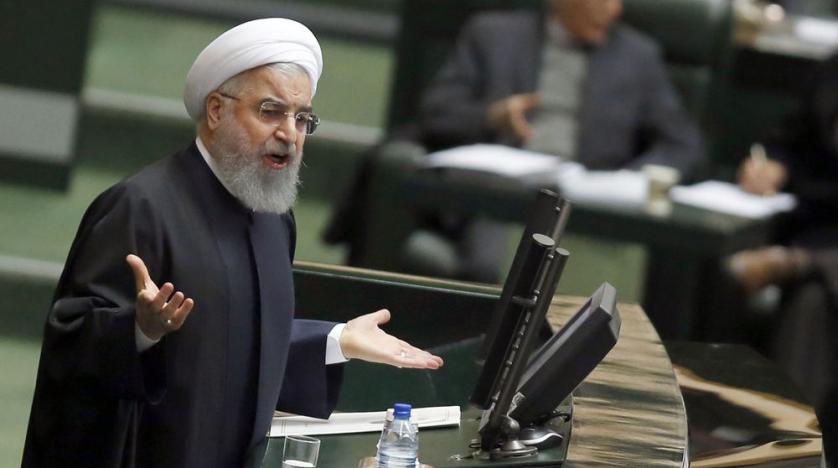Crisis looms as Iran unable to afford its proposed budget
https://arab.news/rtwmj

Iranian President Hassan Rouhani introduced his 2020-2021 budget bill to the country’s parliament (Majlis) late last month, only for lawmakers to reject it. The budget was then referred to the Guardian Council for approval under instruction from Supreme Leader Ali Khamenei. This was another authoritarian move by Khamenei to circumvent the nation’s parliament in order to achieve his parochial objectives.
Iran’s budget bill should normally be approved by March 21 each year, paving the way for the central bank to implement monetary and credit policies to correspond with it. However, there are several crucial problems with the 2020-2021 budget bill.
First of all, although the theocratic establishment was hoping to gain revenue in the next year without relying heavily on oil exports, Rouhani has based the funding of his budget on several unrealistic parameters, including the sale of roughly 500,000 barrels of oil per day. This is a massive overestimation.
Before the US pulled out of the Joint Comprehensive Plan of Action nuclear deal and began taking a tougher stance toward the ruling clerics of Iran, Tehran was exporting more than 2.5 million barrels of oil per day. Iran’s oil exports have since dropped to below 200,000 barrels per day (bpd) — a decline of more than 90 percent.
Even Asian countries or those governments that Iran could generally rely on for buying its oil have significantly decreased their imports from Tehran due to US pressure and the White House’s decision not to extend its waivers for Iran’s eight biggest oil buyers (China, India, Greece, Italy, Taiwan, Japan, Turkey and South Korea). In fact, the Iranian regime has become so desperate to sell oil that it has been offering unprecedented discounts to its Asian oil-buying customers. Furthermore, with the spread of coronavirus, China’s economy appears to be slowing down, and its need for oil imports will most likely decline too.
The second problem with the budget bill is the heavy reliance on accumulating revenue — up to 175 trillion tomans ($41 billion) — from taxes, which is an approximate increase of 25 percent compared to last year’s budget. Where will the regime get this tax revenue from in order to meet its budget’s needs?
People at the top — the billionaires, celebrities and the wealthiest organizations and companies — do not pay taxes thanks to widespread corruption, nepotism and unjust laws. The richest institutions, which are mainly owned by the Islamic Revolutionary Guard Corps or the Office of the Supreme Leader, such as Astan Quds Razavi and Setad, are granted tax exemptions and technically operate outside the formal economy. The head of the State Tax Organization Omid Ali Parsa referred to the 300,000 people in Iran who each have a billion tomans in income, saying: “These billionaires are under the tax rule but more than 50 percent of them don’t pay tax; in fact, these people have no file in the State Tax Organization.”
As a result, the regime will most likely target the ordinary people because, whenever Iran’s leaders have faced economic challenges and sanctions, they have redirected the financial pressure on to the ordinary citizens who make up the majority of the population. But those from the lower and middle classes are already suffering economically. In November last year, the regime made an unexpected decision to increase gasoline prices by 50 percent. Protests spread across the country and some protesters who blocked the roads were heard shouting: “Gasoline is more expensive, the poor have become poorer.” Iran’s devalued currency has also made every basic commodity more expensive and put significant pressure on the ordinary people, but not the wealthy.
Whenever Iran’s leaders have faced economic challenges, they have redirected the financial pressure on to ordinary citizens.
Dr. Majid Rafizadeh
In addition, as Iran is at the center of the coronavirus outbreak in the Middle East, small businesses are being forced to close, which means their income will decline and the amount of taxes they pay will go down too. As Iran’s state-run daily Kayhan acknowledged: “The persistence of the recession will not only lead to further declines in income and livelihoods, but also a large portion of the government's tax revenue projected in the 2020-2021 budget will not be reached and exacerbate the previous deficit. Managing the fight against such a phenomenon should be considered beyond ‘public health’ management and its negative socioeconomic implications should not be overlooked in the national economy.”
For these reasons, Iran is facing a serious economic crisis as it cannot fund its 2020-2021 budget. The bankruptcy of the regime poses a great risk to its hold on power.
- Dr. Majid Rafizadeh is an Iranian-American political scientist. He is a leading expert on Iran and US foreign policy, a businessman and president of the International American Council. Twitter: @Dr_Rafizadeh








































